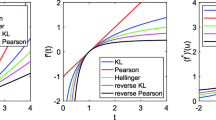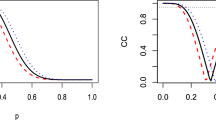Abstract
Consider the loglinear model for categorical data under the assumption of multinomial sampling. We are interested in testing between various hypotheses on the parameter space when we have some hypotheses relating to the parameters of the models that can be written in terms of constraints on the frequencies. The usual likelihood ratio test, with maximum likelihood estimator for the unspecified parameters, is generalized to tests based on -divergence statistics, using minimum -divergence estimator. These tests yield the classical likelihood ratio test as a special case. Asymptotic distributions for the new -divergence test statistics are derived under the null hypothesis.
Similar content being viewed by others
References
Agresti A (2002). Categorical data analysis. Wiley, London
Aitchison J, Silvey SD (1958). Maximum likelihood estimation of parameters subject to constraints. Ann Math Stat 29:813–828
Bhapkar VP (1979). On tests of symmetry when higher order interactions are absent. J Indian Stat Assoc 17:17–26
Bonett DG (1989). Pearson chi-square estimator and test for log-linear models with expected frequencies subject to linear constraints. Stat Probab Lett 8:175–177
Christensen R (1997). Log-linear models and logistic regression, 2nd edn. Springer, Berlin Heidelberg New York
Collet D (1994). Modelling survival data in medical research. Chapman and Hall, London
Cressie N, Pardo L (2000). Minimum -divergence estimator and hierarchical testing in loglinear models. Stat Sinica 10:867–884
Cressie N, Pardo L (2002). Model checking in loglinear models using -divergences and MLEs. J Stat Plan Infer 103:437–453
Cressie N, Read TRC (1984). Multinomial goodness-of-fit tests. J R Stat Soc B 46:440–464
Cressie N, Pardo L, Pardo MC (2003). Size and power considerations for testing loglinear models using -divergence test statistics. Stat Sinica 13:550–570
Gokhale DV (1973). Iterative maximum likelihood estimation for discrete distributions. Sankhya B 35:293–298
Haber M (1985). Maximum likelihood methods for linear and log-linear models in categorical data. Comput Stat Data Anal 3:1–10
Haber M, Brown MB (1986). Maximum likelihood methods for log-linear models when expected frequencies are subject to linear constraints. J Am Stat Assoc 81:477–482
Haberman SJ (1974). The analysis of frequency data. The University of Chicago Press, Chicago
Imrey PB, Koch GG, Stokes ME (1982). Categorical data analysis: some reflections on the log-linear model and logistic regression. Part II. Data analysis. Int Stat Rev 50:35–63
Lang JB (1996). Maximum likelihood methods for a generalized class of loglinear models. Ann Stat 24:726–752
Lang JB, McDonald JW, Smith WF (1999). Association marginal modeling of multivariate categorical responses: a maximum likelihood approach. J Am Stat Assoc 94:1161–1171
Lindsay BG (1994). Efficiency versus robutness: the case for minimum Hellinger distance and other methods. Ann Stat 22:1081–1114
Matusita K (1954). On the estimation by the minimum distance method. Ann Inst Stat Math 5:59–65
Neyman J (1949). Contribution to the theory of the χ2-test. Proceedings of the first symposium on mathematical statistics and probability. Univ. of Berkeley Press, Berkeley, pp. 239–273
Pardo L (2006). Statistical inference based on divergence measures. Statistics: textbooks and monographs. Chapman Hall/CRC, New York
Pardo L, Pardo MC (2005). Nonadditivity in loglinear models using -divergences and MLEs. J Stat Plan Infer 127:237–252
Pardo JA, Pardo L, Zografos K (2002). Minimum -divergence estimators with constraints in multinomial populations. J Stat Plan Infer 104(1).:221–237
Parr WC (1981). Minimum distance estimation: a bibliography. Commun Stat (Theory Methods). 10:1205–1224
Read TRC, Cressie N (1988). Goodness of fit Statistics for discrete multivariate data. Springer, Berlin Heidelberg New York
Searle SR (1971). Linear models. Wiley, New York
Silvey SD (1959). The Lagrangian multiplier test. Ann Math Stat 30:389–407
Vajda I (1989). Theory of statistical inference and information. Kluwer, Dordrecht
Wedderburn RWM (1974). Generalized linear models specified in terms of constraints. J R Stat Soc B 36:449–454
Author information
Authors and Affiliations
Corresponding author
Rights and permissions
About this article
Cite this article
Pardo, L., Menéndez, M.L. Analysis of Divergence in Loglinear Models When Expected Frequencies are Subject to Linear Constraints. Metrika 64, 63–76 (2006). https://doi.org/10.1007/s00184-006-0034-2
Received:
Accepted:
Published:
Issue Date:
DOI: https://doi.org/10.1007/s00184-006-0034-2




